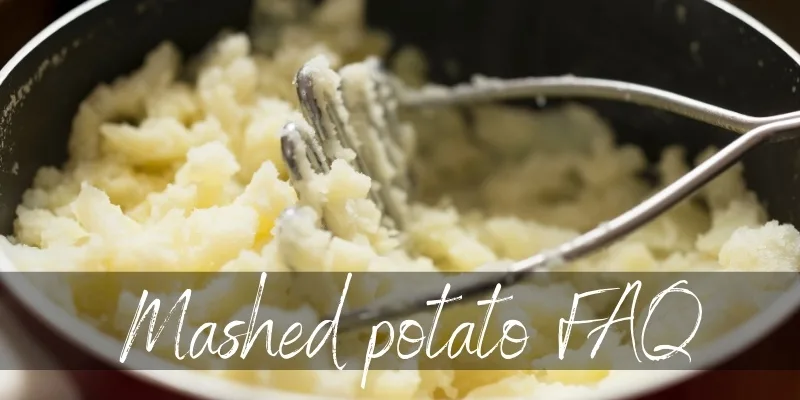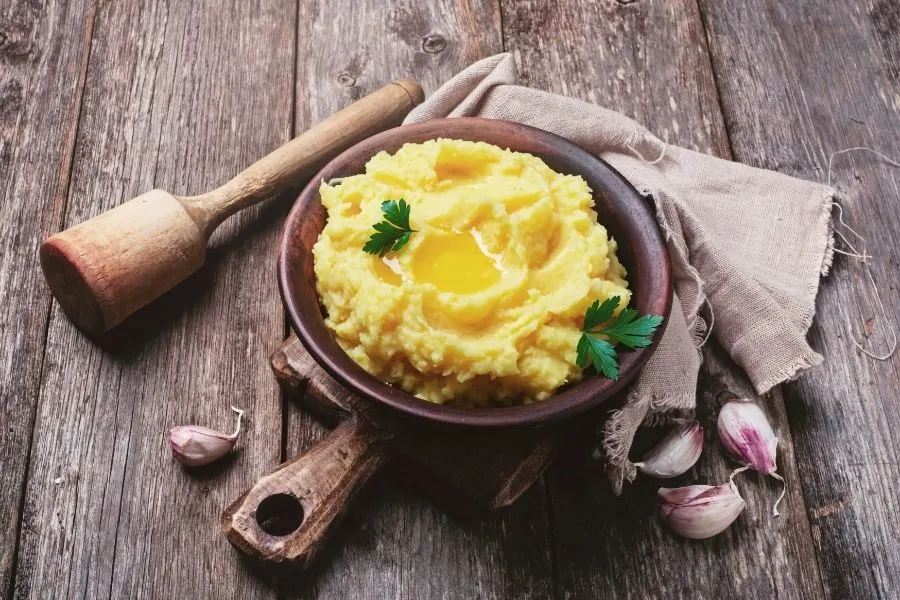Making the perfect mashed potatoes comes with some challenges, especially when you’ve got the potato flake box just looking at you. Tempting you to use them instead of starting from scratch. But there’s just something so good about fresh, home-made mashed potatoes that gives them an extra layer of deliciousness.
So today we’re going to take a look at the most common mashed potato problems, and also explain which are the best potatoes to mash. These are all common mistakes, so once you read through them you’re likely to get much better results. Let’s go !

Why are my mashed potatoes gummy ?
Mashed potatoes end up gummy when you overwork or overmix the potatoes. Potatoes are very starchy vegetables, and the more you mash and mix them, the more starch is released, just like when making oatmeal. So if you’re making your mashed potatoes with a blender or hand mixer you’re likely getting the sticky, gummy mashed potatoes.
This can be a good thing for some people, and a bad thing for others. If you want to avoid you potatoes from getting all gummy, you need to mix them less, or differently. We recommend trying a potato ricer, or mashing the with a fork first, or getting a simple wire potato masher.
If you start out with the mixer you release so mush starch it will absorb a lot of milk and butter, leading to a very sticky mashed potato. If you want a fluffy mashed potato, skip the mixer or blender. If your potatoes are good ones, and are properly cooked, they should break apart without mush effort.
Unfortunately there is no way to make gummy mashed potatoes fluffy. You can only thin them out with some more milk.
Why are my mashed potatoes lumpy ?
Lumpy mashed potatoes are the result of undermixing, not enough mashing, or undercooked potatoes. If you’re using a blander or mixer and want to avoid gummy mashed potatoes you may be tempted to simply not mix them as much, which will result in getting lumpy mashed potatoes.
To fix this simply use a wire masher or potato ricer, and make sure to get all the potatoes.
If your potatoes are not cooked all the way through, they will have hard lumps no matter how hard you try to mash them. To fix this you can take out the lumps and boil them a couple more minutes, then add them to the mash. Or you can make sure they’re all properly cooked through by inserting a fork into the pieces as they are cooking.
Read also: Mashed Potato Substitutes
If you insert a knife, it’s not a good test because it will have a very easy time slicing into anything. Use a fork, as it’s more blunt and thus an accurate test. And even better test is to take the potato piece out and try to break/mash it on a plate.
Keep in mind that you must always cut your potatoes into roughly equal pieces, in order for them to really cook through at the same time. And also make sure there is enough water and room in the pot for the potatoes to properly boil (not simmer).
Why are my mashed potatoes watery ?
Watery mashed potatoes happen when you overcook the potatoes. If you potatoes start to break down while they’re still cooking, the result will be a very water, soupy mashed potato. Avoid this by testing the potato pieces with a fork as they cook, so see when they’re completely cooked through.
Always test more than one pieces, and take pieces from the bottom and the top.
Another reason for watery mashed potatoes is that you’ve left too much cooking water (not drained enough), or added all the milk and butter from the start.
When draining the potatoes, make sure you leave no water at all. Strain them into a colander if you have to. As for how much milk and butter, this is always relative to how you want the potatoes to be and how many potatoes you’ve boiled.
Always add more butter, not more milk. This will give the mashed potatoes a creamier, better flavor. Add in a few pats of butter, mash, and then add just a bit of milk to tie everything together. Then add more butter or milk as you go, in little increments.

Why are my mashed potatoes sour ?
Mashed potatoes can end up sour if you’ve left greenish bits on your potatoes when you peeled them. The green parts on a potato are actually just chlorophyll, which is a pigment that develops when the potato is exposed to direct sunlight.
Always make sure to peel off all the green from your potatoes, otherwise they won’t easily break down (lumpy) and may even turn the whole dish sour.
Another reason for sour mashed potatoes, though it’s less likely, is spoiled milk and/or butter. Normally you should small and taste them before adding into the dish.
Why are my mashed potatoes dry ?
Mashed potatoes can become too dry if you do not add enough liquid and fat, or don’t add any liquid at all. If the liquid you add is cooking water, the potatoes will be bland and will dry out very fast. Always add milk, be it dairy or plant-based.
Another reason for dry mashed potatoes is the cold. If your dish has already cooled, like you’re taking them from the fridge, they are stiff and fairly dry. This is because the starch is a very good binder and keeps the shape of the mashed potatoes intact. Paired with the butter that is now cold in the mash, you get stiff, dry-looking mashed potatoes.
Simply reheat in a somewhat deep plate, with another plate on top as a cover. Reheat on medium, and stir the whole thing every now and then. If they’re still dry, add a bit of butter.
Read Also: Why Is Popcorn A Movie Snack ?
The best potatoes for mashed potatoes
The perfect mashed potato needs the prefect, starchy potato. Russet and Yukon gold, starchy potatoes, are what you’re looking for. These guys have a higher starch content than other potato types, which means they will easily absorb the milk and butter when you’re mixing. It also means they will break down evenly, into fluffy clumps that won’t stick together as mush.
Waxy potatoes are better to keep whole, as they have a denser structure and will get you a very lumpy mashed potato. You may not always see the label on the potatoes as you’re buying them. But most companies will at least state what the potatoes are good for, like boiling, baking, frying.
So for mashed potatoes, get boiling potatoes, because these will always give you that fluffy, light texture.

